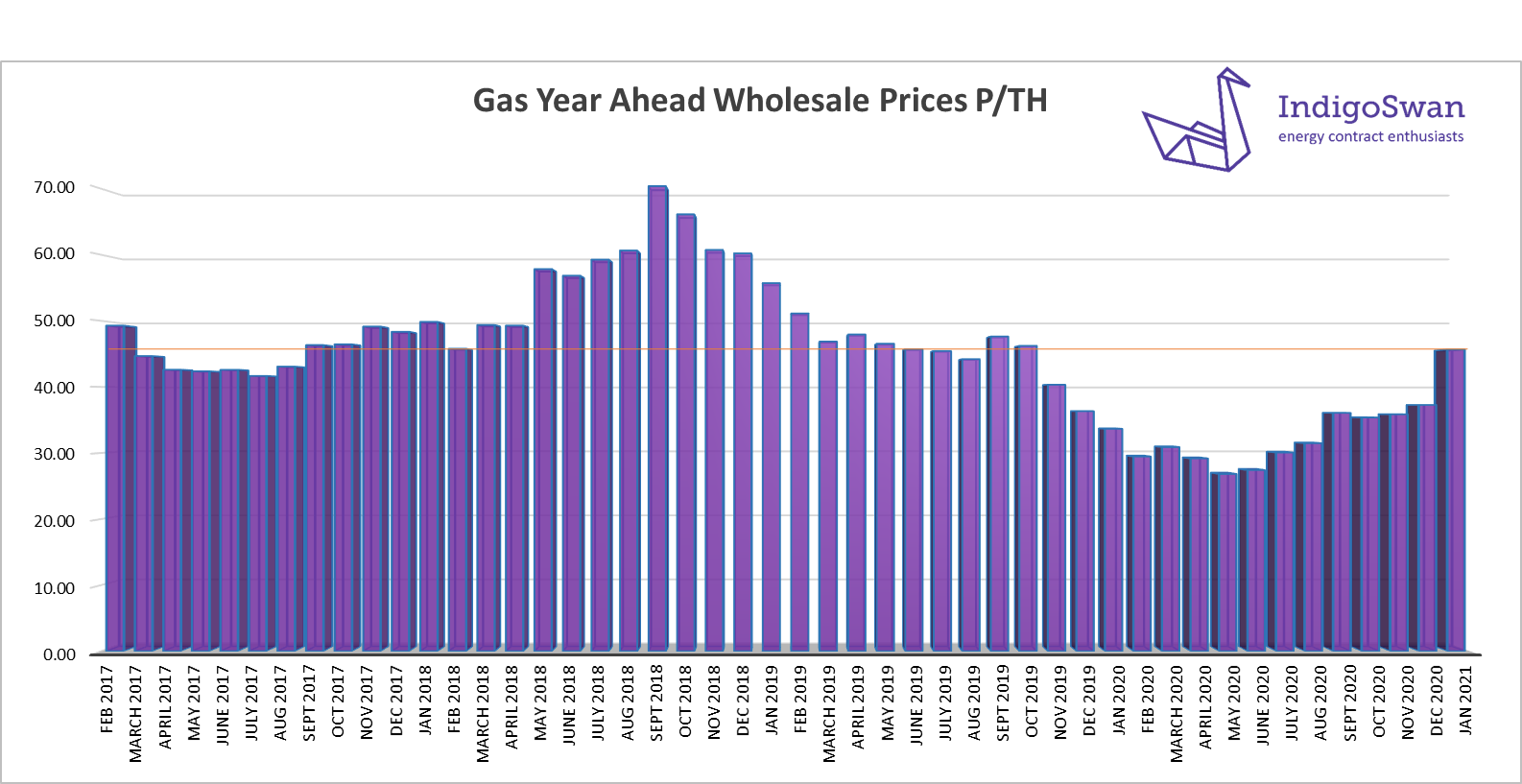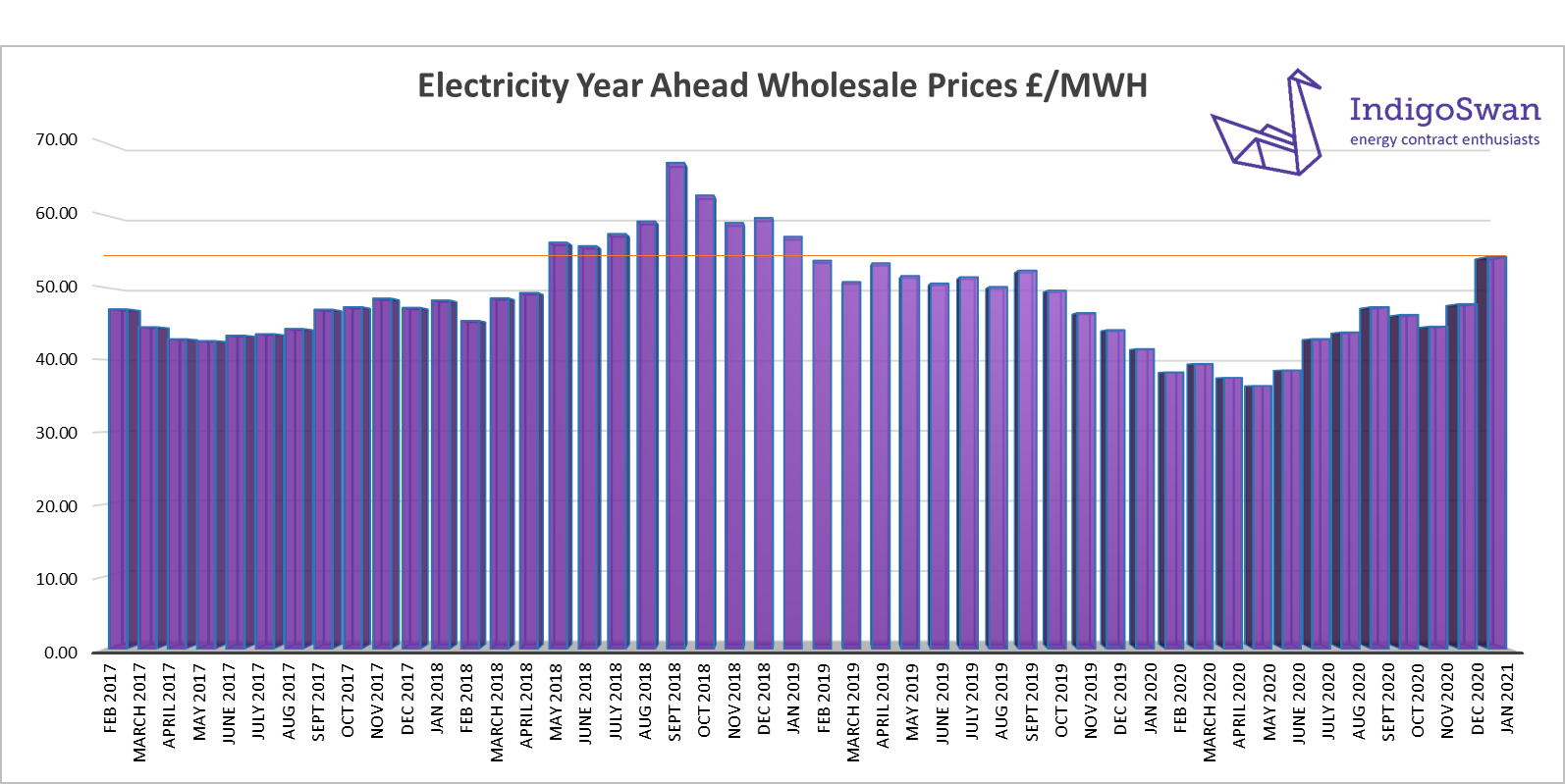
As of the 5th January, Gas and Electricity Year Ahead Wholesale costs are higher, when compared to last month’s report.
The price of Oil has steadily increased over the last month, from $49 to $53 a barrel, the highest since February 2020. The announcements of immunisation programmes to combat the coronavirus has provided more optimism for an economic recovery and a greater need for Oil. However, the new more contagious strain has limited price gains. OPEC+, which includes Saudi Arabia and Russia, have agreed to review production levels through 2021.
Below seasonal norm temperatures have increased the need for Gas for heating as well as being required to provide additional Electricity through generation. There is also a concern that LNG deliveries are heading to Asia due to a higher price. The new national lockdown and the demand uncertainties this brings, has eased prices.
Renewable generation levels were similar to November, but with a greater demand, more expensive Gas and Coal was utilised, adding upwards pressure to the Wholesale price.
The Met Office forecast for the next month suggests milder temperatures which will reduce the pressure on Gas and Electricity prices, although there is the potential for some snowfall.
Wholesale prices for 2021 are high when compared to 2020 but are comparable to 2019 and lower than 2018. Prices for 2022 and 2023 show much better value. It should be remembered that the Wholesales element makes up in the region of just 40% of the total cost of an Electricity bill and roughly 60% for Gas.
Increasing third-party costs are noticeable in Electricity contracts. These include, Transportation, Distribution, and government policy levies. The levies help balance supply and demand.
Over the next few years, the way some of these charges are calculated will change, under the Targeted Charging Review, full details are not yet available. Initially the first change to Transportation costs was due April 2021, but with delays issuing price guidelines to energy suppliers, this has been postponed until April 2022. The planned change to Distribution charges is still set for April 2022. This does mean that the expected opening of some fixed priced contracts should not take place until 2022.
There has been recent pressure on 2021 prices due to higher demand and supply concerns, so there is potential for prices to fall, but this is by no means certain. With much better value in longer term contracts, we would advise looking at your options for contracts ending 2021. Be aware that suppliers have tightened their credit requirements and reduced their risk appetite. Good forward contract options can still be negotiated.
Please contact us on 0333 320 0475 to discuss options or to get a latest update.
On the 5th January, the Gas Year Ahead Wholesale cost was 45.65 (p/th), from 37.27 (p/th) in last month’s report and 35% higher than 2020.
Low temperatures and above seasonal norm demand have added pressure to Gas prices which rose steadily throughout December. There is the potential that this will ease in the coming weeks.
Although we saw a steady delivery of LNG in December, a very high price being offered in Asia is likely to mean shipments are diverted away from Europe. Our Gas storage levels are lower than 2020 and so any concern of disruptions to LNG or other issues, does mean the potential for more volatility.
The need for Gas to meet a higher Electricity demand and reductions from other sources, such as Renewables, adds an additional price pressure.
Let us know if you would like us to research your options for 12, 24 and 36 month contracts.

On the 5th January, the Electricity Year Ahead Wholesale cost was 54.21 (£/MWh), from 47.68 (£/MWh) in last month’s report and 31% higher than 2020.
The combined Wind and Solar in December provided 22% of generation, the same as November, although there was a significant increase in demand.
In response, Gas generation increased to 39%, when the Gas cost was higher, and Coal met 2%. These more expensive forms of generation increased the Electricity Wholesale price.
The recent cold weather and the concern that Gas supplies may be tight over the coming months, has meant that 2021 Wholesale prices have risen. This week has seen some easing of price pressure due forecast milder temperatures and the new lockdown, which could reduce demand.
The industry remains confident that it can cope with changing demand patterns. National Grid has mechanisms in place to secure generation or reduce demand. Although these mechanisms do come at a cost, in the form of higher third-party charges within Electricity bills, they do provide an element of stability to prices which otherwise may react with far more volatility.
Let us know if you would like us to research your options for 12, 24 and 36 month contracts.

"Indigo Swan were professional but with a personable approach. Their market knowledge allowed me to enter new contracts with confidence, this was something I was unable to do with my previous broker."
Joanna Thornton, Estate Manager
"The experience behind the Indigo Swan team, their passion and integrity were all important to us. They clearly understood the market and could provide the best advice. "
Phil Riseborough, Head of Facilities
"We’ve worked with other energy consultants, but with Indigo Swan we get real integrity and service that is way beyond our expectations. We have already saved over £120k."
Jason Wakefield, Procurement Manager
| Cookie | Duration | Description |
|---|---|---|
| TawkConnectionTime | session | Tawk.to, a live chat functionality, sets this cookie. For improved service, this cookie helps remember users so that previous chats can be linked together. |
| Cookie | Duration | Description |
|---|---|---|
| SRM_B | 1 year 24 days | Used by Microsoft Advertising as a unique ID for visitors. |
| Cookie | Duration | Description |
|---|---|---|
| CONSENT | 2 years | YouTube sets this cookie via embedded youtube-videos and registers anonymous statistical data. |
| MR | 7 days | This cookie, set by Bing, is used to collect user information for analytics purposes. |
| _ga | 2 years | The _ga cookie, installed by Google Analytics, calculates visitor, session and campaign data and also keeps track of site usage for the site's analytics report. The cookie stores information anonymously and assigns a randomly generated number to recognize unique visitors. |
| _gat_gtag_UA_12371872_1 | 1 minute | Set by Google to distinguish users. |
| _ga_* | 1 year 1 month 4 days | Google Analytics sets this cookie to store and count page views. |
| _gcl_au | 3 months | Provided by Google Tag Manager to experiment advertisement efficiency of websites using their services. |
| _gid | 1 day | Installed by Google Analytics, _gid cookie stores information on how visitors use a website, while also creating an analytics report of the website's performance. Some of the data that are collected include the number of visitors, their source, and the pages they visit anonymously. |
| Cookie | Duration | Description |
|---|---|---|
| ANONCHK | 10 minutes | The ANONCHK cookie, set by Bing, is used to store a user's session ID and also verify the clicks from ads on the Bing search engine. The cookie helps in reporting and personalization as well. |
| MUID | 1 year 24 days | Bing sets this cookie to recognize unique web browsers visiting Microsoft sites. This cookie is used for advertising, site analytics, and other operations. |
| test_cookie | 15 minutes | The test_cookie is set by doubleclick.net and is used to determine if the user's browser supports cookies. |
| VISITOR_INFO1_LIVE | 5 months 27 days | A cookie set by YouTube to measure bandwidth that determines whether the user gets the new or old player interface. |
| YSC | session | YSC cookie is set by Youtube and is used to track the views of embedded videos on Youtube pages. |
| yt-remote-connected-devices | never | YouTube sets this cookie to store the video preferences of the user using embedded YouTube video. |
| yt-remote-device-id | never | YouTube sets this cookie to store the video preferences of the user using embedded YouTube video. |
| yt.innertube::nextId | never | This cookie, set by YouTube, registers a unique ID to store data on what videos from YouTube the user has seen. |
| yt.innertube::requests | never | This cookie, set by YouTube, registers a unique ID to store data on what videos from YouTube the user has seen. |
| Cookie | Duration | Description |
|---|---|---|
| CLID | 1 year | No description |
| SM | session | No description available. |
| twk_idm_key | session | No description |
| _clck | 1 year | No description |
| _clsk | 1 day | No description |
